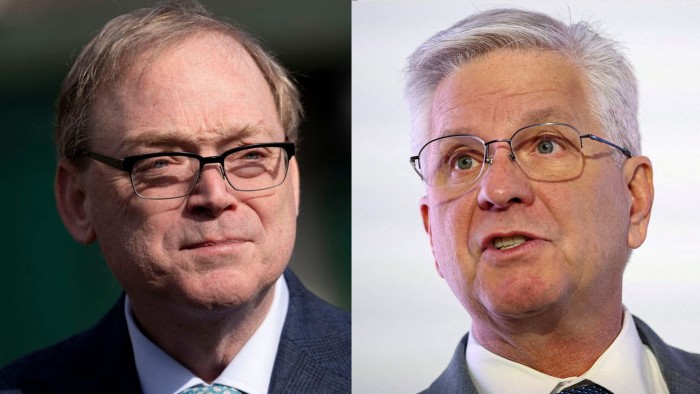Unlock the Editor’s Digest for free
Roula Khalaf, Editor of the FT, selects her favourite stories in this weekly newsletter.
Academic economists overwhelmingly want Federal Reserve governor Christopher Waller to succeed Jay Powell as chair of the central bank next year — but few think he will get the job.
In a Financial Times poll conducted by the Clark Center for Global Markets at the University of Chicago’s Booth School of Business, 82 per cent of the economists surveyed chose Waller as their favourite to become head of the world’s most important central bank.
However, just a fifth of the academics polled think he will succeed Powell in 2026.
Instead, Kevin Hassett is seen as the man most likely to head the Fed by the 44 respondents, with 39 per cent saying the chair of the White House’s National Economic Council is the favourite.
The split between who economists want to get the job and who they think will become the next chair reflects the fierce pressure the Fed has come under from US President Donald Trump.
Trump has repeatedly said that he wants the Fed to cut rates to 1 per cent — a move he claims would boost growth and lower the US government’s borrowing costs. He has labelled Powell a “moron” and a “numbskull” for refusing to lower interest rates at such an aggressive pace.
The Fed this month cut rates for the first time since December, lowering the benchmark federal funds target range by a quarter point to 4-4.25 per cent.
Trump’s latest pick for the Fed board, Stephen Miran, was the sole dissenter, backing a 50 basis point cut — and calling for an additional five quarter point cuts by the end of the year, more than double what any other senior Fed official wants.
Waller did not back Miran’s calls for a bigger half-point, despite being one of two dissenters supporting a quarter-point cut at the previous vote in July.
“Waller looks like a central banker, rather than someone who is prostrating himself for the job of Fed chair,” said Robert Barbera, of Johns Hopkins University. “And that’s precisely why he won’t get it.”
None of the respondents to the poll want Miran to become the next chair — though a fifth view him as the likeliest candidate.
Betting markets, meanwhile, think Waller is the favourite, with Hassett a close second.
Trump has suggested former Fed governor Kevin Warsh, Hassett and Waller are his preferred picks. He views loyalty and a willingness to aggressively cut rates as essential requirements for whoever he chooses.
Pressure on the US central bank was raised several notches last month when Trump attempted to fire Fed governor Lisa Cook over allegations of mortgage fraud.
Cook has denied the allegations and is contesting the US president’s move in court, in what is set to become a landmark case in establishing how strong the separation between monetary policymaking and the executive branch is.
US Treasury secretary Scott Bessent is currently conducting a first round of interviews for the new Fed chair, with Marc Sumerlin — one of 11 candidates on the longlist — interviewed on Friday.
The first round of the interview process is expected to conclude within the next two weeks.
Bessent — a former favourite, until Trump signalled he wanted the former hedge fund manager to stay put at the Treasury — has signalled that he would like the next Fed chair to rethink the US central bank’s governance and shrink its balance sheet, which has been bloated by quantitative easing operations.
The respondents to the FT Chicago-Booth poll picked from a list of five candidates seen as favourites for the role of Fed chair — Waller, Hassett, Bessent, Warsh and Miran.
The successful candidate could face the challenge of steering monetary policy amid a weakening US labour market and inflation driven up by Trump’s tariffs on US imports.
Most Fed officials think Trump’s tariffs will induce one-off rises in the price of a small number of US goods and are prioritising a slowdown in job creation over the risk of a wave of US inflation.
However, the academic economists polled believe that the prospect of a bout of stagflation, where unemployment and inflation both rise at the same time, is increasing.
“The dual mandate puts the Fed in a bind, but if recent history is any guide — the last couple of decades, at least — the FOMC tends to prioritise employment over inflation,” said Nikolai Roussanov, of the Wharton School.
Brad DeLong, of the University of California, Berkeley, warned of slowing growth as global supply chains reroute around the US because of tariffs.
“Something is likely to break badly” in the economy, he said.

